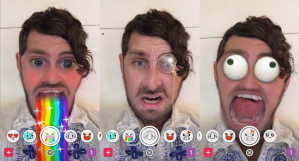Our social understanding of privacy has changed drastically in the past decade. One radical change has been the exposé of the NSA perpetrated by Edward Snowden. He blew the whistle on NSA’s mass surveillance of the American people. The NSA was secretly collecting and analyzing millions of American’s cellphone records in a program referred to as PRSIM. This radical revelation changed the American people’s perception of their own privacy, especially in the eyes of the government. It revealed to them that their “private messages” weren’t really so private after all. Some argue that if they aren’t doing anything wrong, why should they care if the government reads their messages? Alessandro Acquisti refutes their ideology with this statement: “any personal information can become sensitive information.” supporting this claim with the example of Facebook’s facial recognition algorithm which can take an innocuous photograph of a stranger and identify personal information about said person. Another shift in our perception of privacy comes from employers checking applicant’s social media accounts. This phenomena has resulted in articles such as “The 7 Social Media Mistakes Most Likely to Cost You a Job” by Time and “How Social Media Can Help (Or Hurt) You In Your Job Search” by Forbes.
Alessandro Acquisti describes the shift in boundaries between what is regarded as public vs private information as an “Adam and Eve” moment, where we suddenly realize “we aren’t wearing any clothes.” He uses this metaphor to reveal the rapid and mostly silent changes in what is being regarded as private. It dawned upon the public suddenly that the information they were willingly sharing had been increasing without much thought.
Facial recognition of photos referenced to Facebook is a double edged sword. On one hand it can help law enforcement and espionage agencies identify targets who act as threats to other’s life and liberty. However, on the other hand the same technology can be used by the ‘bad guys” to reveal sensitive information about someone with something as common as a photograph. Either way, this technology is here to stay. Snapchat has even adopted facial recognition code for interactive filters in their most recent update.
This technology should make Facebook users reconsider posting pictures of their faces associated with personal identifying information publicly, especially if one desires to commit a crime and get away with it. As discussed in Alessandro Acquisti’s TED Talk marketing companies can theoretically make composite images of friends you interact with often on social media and then use that face in an advertisement to sell you something; “you will not even know that this is happening.” according to Acquisti. There are currently no laws protecting against the use of your publicly available likeness in such a manner, perhaps it should be up to the internet user to police what information about them is publicly available. On the other hand, it should be the government’s job to protect the privacy of its people and one manner of protection should be creating regulations that restrict companies from using anyone’s likeness without their expressed consent.
I believe that a “future without secrets” is not ahead of us from my current perspective. There still exists personal choice in what people decide to share on the internet. Big Data is an important industry for tracking population shifts and tendencies and I see nothing wrong with the anonymous collection of information, if and only if it is truly anonymous. As long as there still exists personal choice in what we share on the internet, and not a government mandated publicly available database about every individual, we won’t exist in a world without secrets. Secrets are always going to exist because of their inherent nature of existing solely within the minds and documents of the secret keepers who take care to keep them as secrets. As data collection technology improves, I predict an industry dedicated to personal security will arise to combat the increasing scope of what is considered public information. Imagine a company who will track down and legally remove personal information about you on the internet. I personally share a fair information about myself on my Facebook profile which I have no problem with because it is only available — to the best of my knowledge– to the people who I approve to be my friend.
In order to protect myself I can make my accounts “private” to stop strangers from viewing my profiles, however I also feel as if this comes off as socially restricting. Peers can’t browse my profile and get an impression of me before/after meeting me for the first time without first alerting me of their visit to my page with a friend/follow request. After all, we tailor our social media profiles so that people get a good impression of us, don’t we?